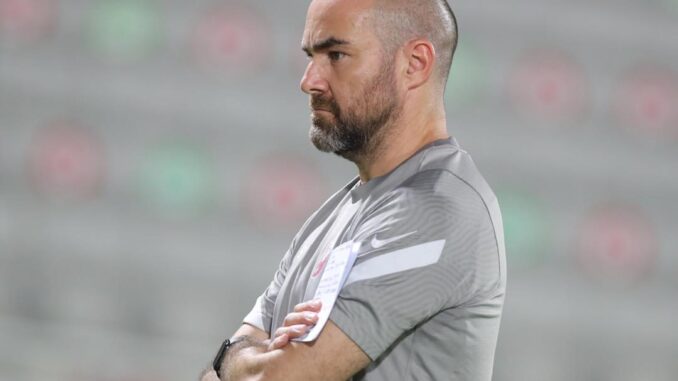
Fresh from saving this year’s domestic continental season in Asia, Qatar go one step further this week, with a parting gift to a year of misery in international football.
Over a year has passed since the last World Cup/Asian Cup qualifying ball was kicked in anger, a glimpse back to a time that now feels like a generation ago, rather than the mere 13-month vacuum.
Just when we were expecting to have to wait another four months until the next FIFA window opened in March, temporary solace to Asian international followers comes in the form of the only competitive international of this calendar year; Qatar v Bangladesh this Friday.
The events of the last few months will leave few surprised at the name of the hosting nation of course. Qatar came to the rescue back in the summer, in first saving the West, and subsequently the East, side of the draw for the AFC Champions League, which will draw to a close in Al Wakrah on 19 December.
The monumental task of staging, in effect, two separate round-robin tournaments in such a short time period in normal circumstances is one thing, but the logistical tightrope of doing so amidst a global pandemic, with the whole continent watching on is another thing entirely.
While the plaudits rain in – quite rightly, cynics have reiterated the thorn in Qatar’s side over the last ten years; this is another example, they argue of sport washing away their national ills.
The very fact however the AFC can resolve a domestic club season purely with Qatar’s efforts is going to be a difficult pill to to swallow if their biggest critics go on to secure silverware (we’re all looking at you Melbourne Victory and Australia…)
Qatar’s insistence to save the day in World Cup qualifying seems less necessary, given only one of a typically slated 16 match game week is being rearranged, you’d be right to ask; why would you bother?
Strangely, FIFA, usually stubborn to budge from their fixed international windows, have permitted the match, on the grounds that both teams ply their trade domestically (limiting cross contamination/travel); but ultimately it signals the growing influence Qatar is wielding both within FIFA and, significantly, in the corridors of power in Kuala Lumpur.
From significant outsiders to host the 2027 edition of the Asian Cup only a year ago, the last few months have edged Qatar up the pecking order significantly. They offer security like no other, that an event can be held at a moment’s notice, with the stadia and infrastructure already in place (having been completed in time for the World Cup) all to become the oddly “safe” pick amongst the leading candidates.
The once poisoned political war of words between Qatar and Saudi Arabia is also becoming suppressed, after Gianni Infantino’s left-field announcement last month of the newly formed FIFA Arab Cup; a FIFA sponsored World Cup precursor that is hoped to bring peace to the Middle East (yes, you read that correctly). Who saw this coming, hey? You’ll be equally amazed to hear that the host once again is Qatar.
As has been the case for the past decade, however, success off-the-pitch is usually counterbalanced by struggles on it (and vice versa, see the Gulf crisis overspill as Qatar became Asian champions).
Since their 2019 continental triumph, the Maroon have yet to hit the heights we possibly expected of them as they built towards 2022.
Initial qualifiers have been comfortable enough admittedly, but when tested at the next level – at the Copa America for example – and in higher profile friendlies, the lack of options at Felix Sanchez’s finger tips has left them looking one-dimensional, often symbolised by what run of form chief goal-getter Almoez Ali finds himself in – poignantly erratic.
2020 has been one to forget for most, of course, but for Qatar two defeats (a humbling defeat by Ghana back in October, followed by defeat to South Korea) and a draw (a drab 1-1 with Costa Rica last month) underlines a winless calendar year, however it’s sold in future years, as a severe blot on their copy book.
Their opposition this week, however, in Bangladesh should be a different story. Despite an upturn in form under Jamie Day at the latter end of 2019 – highlighted by a highly impressive away point in India – Bangladesh were starting from a low base.
Their narrow defeat to Qatar in Dhaka last year was rose tinted given the waterlogged quagmire of a pitch the reigning Asian champions had to trudge through. Expect a chalk and cheese surface in Doha.
Bangladesh’s preparation hasn’t exactly been ideal either, adding justification to the question of why they exactly agreed to reschedule this qualifier at this point?
With the long quarantines, separate training camps and enforced isolation of those with positive COVID tests, it’s clear one side have had to go through the ringer significantly more than their opposition to get to this point
Jamie Day has only just landed in Doha himself after serving his isolation for a positive test in the last couple of weeks. His presence on the pitch side will likely go down to the wire, depending on whether he’s allowed to circumnavigate quarantine protocols upon arrival.
It all adds up to an expectant Qatar victory that could seal another year’s worth of talking points; we’ve had plenty of them recently.
The need to reschedule may end up being little more than superficial; meagre help in defusing any schedule blockages coming up, Qatar are due to play only two matches over the four remaining Round 2 match slots across March and June in the new year.
The only benefit on that basis is a calmer build up to June’s rescheduled Copa America – a tournament at which Qatar need to start proving their worth. Qatar’s investment in merely facilitating football in a COVID-hit 2020 has been significant and should be well appreciated across Asia.
Their influence on and off it, in winning supporters in high places and mirroring the good news stories their way is one thing, but the football that follows needs to keep up.
For now, 2020 in many ways closes with everyone talking about Qatar. Deja vu?
Photo: Qatar Football Association
Listen to Paul Williams and Michael Church discuss the rescheduled AFC Champions League and Qatar’s role in staging the competition




